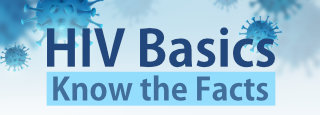HIV & Anal Cancer
The incidence of anal cancer is higher among people with HIV and is similar to cervical cancer. The good news is that treating precursor anal cancer lesions can significantly reduce the risk of progression to full blown anal cancer.
This section covers the basics of anal cancer along with instructions on how to perform a DARE (digital ano-rectal examination) on yourself or your partner to check for precursor anal cancer lesions.
Quicklinks:
Anal Cancer
Anal cancer is a disease in which cancer cells are present just inside or immediately outside the anus.
Most cases of anal cancer are linked to human papillomavirus (HPV), a very common infection that can be passed on during sex. HPV is not a single virus – there are about 150 types of HPV that have different effects. Some types of HPV don’t seem to do any harm, other types cause anal and genital warts, while others can cause anal and cervical cancer. HPV16 and HPV18 are the types most likely to cause cancer.
Most adults have had HPV infection. Very often, the body can get rid of the virus without you ever knowing you had it. In people living with HIV, the body seems to be less able to get rid of HPV on its own. As a result, rates of anal cancer are higher in people living with HIV.
An estimated 100 per 100,000 men living with HIV (who have sex with men), have anal cancer versus 20 to 30 per 100,000 men not living with HIV. Cervical cancer, which is caused by the same common HPV virus as anal cancer, occurs in about 10 per 100,000 of women.
Most adults have had HPV infection. Very often, the body can get rid of the virus without you ever knowing you had it. In people living with HIV, the body seems to be less able to get rid of HPV on its own. As a result, rates of anal cancer are higher in people living with HIV.
An estimated 100 per 100,000 men living with HIV (who have sex with men), have anal cancer versus 20 to 30 per 100,000 men not living with HIV. Cervical cancer, which is caused by the same common HPV virus as anal cancer, occurs in about 10 per 100,000 of women.
A minority of people who have HPV develop abnormal cell changes in or around the anus. This is not cancer. Moreover, most people who have these abnormal cells do not go on to have cancer. It is important to distinguish between:
- Infection with HPV.
- Abnormal cell changes that don’t seem to be linked to cancer. They don’t need treatment. Doctors may refer to these abnormal cells as low-grade anal intraepithelial neoplasia (AIN) or low-grade squamous intraepithelial lesion (SIL).
- Abnormal cell changes that are associated with a small risk of developing cancer in the future. Often these abnormal cells will go away on their own, but in case they don’t, many doctors would recommend treatment. These abnormal cells may be called high-grade anal intraepithelial neoplasia (AIN) or high-grade squamous intraepithelial lesion (SIL).
- Anal cancer. Cancer cells grow and multiply out of control. They may form a mass (tumour) and invade nearby tissues. Anal cancer can be life threatening.
Preventing HPV and anal cancer
You can reduce your risk of HPV and cancer by getting vaccinated. HPV vaccination can prevent several cancers (including anal and cervical cancer) and also genital and anal warts.
The younger you are, the more likely you are to benefit. If you are older, it is more likely that you have already been exposed to several types of HPV, making the vaccine less effective.
Vaccination involves taking a course of three injections, over a six-month period. In New Zealand, the HPV vaccine is available free for to anyone aged 9-26 years. If you are over 26, talk to your HIV or sexual health doctor about getting vaccinated, you may still be able to access the vaccine free of charge depending on your circumstances, otherwise there will be a small cost.
The younger you are, the more likely you are to benefit. If you are older, it is more likely that you have already been exposed to several types of HPV, making the vaccine less effective.
Vaccination involves taking a course of three injections, over a six-month period. In New Zealand, the HPV vaccine is available free for to anyone aged 9-26 years. If you are over 26, talk to your HIV or sexual health doctor about getting vaccinated, you may still be able to access the vaccine free of charge depending on your circumstances, otherwise there will be a small cost.
Using a condom during sex can also help to prevent further HPV infection.
The ANCHOR study, involving nearly 4,500 people living with HIV at 21 sites across the United States, has definitively determined that regular screening and treatment of anal pre-cancer (otherwise known as high-grade squamous intraepithelial lesions - SIL) in PLHIV, significantly reduced the chances of progression to anal cancer—which, though it has good survival rates, involves highly unpleasant treatment.
Annual screening by your GP through DARE, Anal Pap Smears / Anoscopy will detect any pre-cancerous cells and provide pre-emptive treatment options and improved outcomes. Self or Partner DARE can also help detect early signs of pre-cancerous cells and could be life saving.
The ANCHOR study, involving nearly 4,500 people living with HIV at 21 sites across the United States, has definitively determined that regular screening and treatment of anal pre-cancer (otherwise known as high-grade squamous intraepithelial lesions - SIL) in PLHIV, significantly reduced the chances of progression to anal cancer—which, though it has good survival rates, involves highly unpleasant treatment.
Annual screening by your GP through DARE, Anal Pap Smears / Anoscopy will detect any pre-cancerous cells and provide pre-emptive treatment options and improved outcomes. Self or Partner DARE can also help detect early signs of pre-cancerous cells and could be life saving.
Who is at risk?
High-grade AIN and anal cancer are rare in the general population, but rates are much higher in people with HIV and other individuals with weakened immune systems.
People who have had receptive anal sex, more sexual partners or genital warts are more likely to be infected with multiple types of HPV. This makes high-grade AIN and anal cancer more likely. However, high-grade AIN and anal cancer can develop in people who have never had anal sex or HIV.
Smoking makes abnormal cell changes happen more quickly. Stopping smoking can reduce your risk of anal cancer and may help prevent high-grade AIN progressing to cancer.
People who have had receptive anal sex, more sexual partners or genital warts are more likely to be infected with multiple types of HPV. This makes high-grade AIN and anal cancer more likely. However, high-grade AIN and anal cancer can develop in people who have never had anal sex or HIV.
Smoking makes abnormal cell changes happen more quickly. Stopping smoking can reduce your risk of anal cancer and may help prevent high-grade AIN progressing to cancer.
The risk of high-grade AIN and anal cancer increases as you get older. Because of this, it is advised that MSM living with HIV who are aged 50+ have an annual digital anorectal examination.
Women who have previously had abnormal cervical screening results have a higher risk of anal cancer than other women. This is because HPV can spread between the genitals and the anus.
Anal cancer in people living with HIV
People living with HIV are at much greater risk of having high-grade AIN or anal cancer than other people.
It seems that HIV’s effect on the immune system reduces the body’s ability to keep HPV infection under control.
Taking HIV treatment and maintaining a high CD4 count help protect against AIN and anal cancer, but anal cancer can occur in people taking effective HIV treatment. Because people with HIV are living longer, cancers like this have more time to develop.
In 2012, the results of large study which tracked around 35,000 Americans living with HIV, confirmed that rates of anal cancer were much higher than in people who don’t have HIV. It also showed different rates between gay men, heterosexual men and women:
Taking HIV treatment and maintaining a high CD4 count help protect against AIN and anal cancer, but anal cancer can occur in people taking effective HIV treatment. Because people with HIV are living longer, cancers like this have more time to develop.
In 2012, the results of large study which tracked around 35,000 Americans living with HIV, confirmed that rates of anal cancer were much higher than in people who don’t have HIV. It also showed different rates between gay men, heterosexual men and women:
- In a group of 1000 gay men living with HIV, followed for 10 years, around 13 will develop anal cancer during that time.
- In a group of 1000 heterosexual men living with HIV, followed for 10 years, around 5 will develop anal cancer.
- In a group of 1000 women living with HIV, followed for 10 years, around 3 will develop anal cancer.
Another study, finished early in 2021 due to overwhelming evidence that - treating anal cancer precursor lesions reduces cancer risk for people living with HIV. According to the ANCHOR study lead investigator Joel Palefsky, HIV-positive gay and bisexual men have an 80 to 100-fold greater risk of anal cancer compared with the general population.
In 2023 the International Anal Neoplasia Society updated their guidelines for anal cancer screening, now recommending that men who have sex with men (MSM) who are living with HIV, should get screened annually from the age of 35. They also recommend that other groups living with HIV (women, and men who have sex with women), along with HIV negative MSM should get screened annually from age 45.
In 2023 the International Anal Neoplasia Society updated their guidelines for anal cancer screening, now recommending that men who have sex with men (MSM) who are living with HIV, should get screened annually from the age of 35. They also recommend that other groups living with HIV (women, and men who have sex with women), along with HIV negative MSM should get screened annually from age 45.
Symptoms
Anal cancer can cause symptoms in the anal area, including bleeding, pain, discomfort, itching, small lumps or ulcers on or inside the anus, a discharge, and difficulty controlling your bowels.
People with low or high-grade AIN often have no symptoms, but it sometimes causes similar symptoms to anal cancer.
People with low or high-grade AIN often have no symptoms, but it sometimes causes similar symptoms to anal cancer.
Similar symptoms can be caused by common health problems like haemorrhoids. It’s worth having them checked by a sexual health doctor or your GP. While some people are embarrassed or uncomfortable discussing this area of their body, it’s not unusual for doctors to examine the anus.
Anal Pap Smear & Anoscopy
An Anal Pap Smear is a screening test for anal cancer in men and women, it is regarded as the counterpart of the Cervical Pap Smear. Also called anal cytology, it's performed by taking a sample of cells from the anus that are then examined under a microscope in a lab. It's not a diagnostic test, but rather looks for precancerous or cancerous cells. If abnormal cells are found, further testing will be necessary. The anal Pap does not test for colon or rectal cancer.
The Anal Pap Smear is quick and simple. Using a moistened swab, a clinician collects cell samples from the anal canal by swabbing all surfaces of the anus and rectum. The swab is then smeared on slides and sent to the pathologist for examination.
For an Anoscopy, your doctor will insert a device called an anoscope into your anus. The anoscope is a rigid hollow tube, between 3-5 inches long, and it’s about 2 inches wide. The anoscope is equipped with a light and allows the doctor to examine the anus and rectum in detail.
The Anal Pap Smear is quick and simple. Using a moistened swab, a clinician collects cell samples from the anal canal by swabbing all surfaces of the anus and rectum. The swab is then smeared on slides and sent to the pathologist for examination.
For an Anoscopy, your doctor will insert a device called an anoscope into your anus. The anoscope is a rigid hollow tube, between 3-5 inches long, and it’s about 2 inches wide. The anoscope is equipped with a light and allows the doctor to examine the anus and rectum in detail.
There is nothing you need to do in advance of your Anal Pap Smear or Anoscopy to prepare for it. However, there are a number of things you should not do beforehand to ensure accurate results. During the 24 hours before having an Anal Pap Smear or Anoscopy, do not:
- Have receptive anal intercourse
- Put any creams, lubricants, or medications into your anus
- Insert sex toys or other objects into your anus
- Douche or use enemas
Treatment and management
If you have low-grade AIN, no treatment is needed. You may be asked to come back in six or twelve months for another screen.
If you have high-grade AIN, one of the following treatments may be offered:
If you have high-grade AIN, one of the following treatments may be offered:
- Surgery to remove lesions that cover only a small area.
- A cream that you apply yourself to the affected area. You’ll do this two or three times a week for three or four months. This works best for wide areas of AIN, especially in the external skin.
- Ablative therapies. Various techniques are used to destroy the affected areas with heat or by freezing them. Some of the names of these techniques are electrocautery, laser ablation, infrared coagulation and cryotherapy.
If you have anal cancer, the recommended treatment is chemoradiotherapy, in other words a combination of chemotherapy and radiotherapy, usually over a period of five weeks. Chemotherapy uses strong drugs to destroy cancer cells and prevent the cancer from spreading. Radiotherapy uses beams of radiation to destroy the cancer cells, in a localised area only.
Chemoradiotherapy is usually successful but does sometimes cause long-term complications. These can include problems in relation to your bladder, bowels and sexual function.
Chemotherapy and radiotherapy both suppress the immune system, which may result in a significant drop in your CD4 count. You should be given drugs to prevent opportunistic infections (this is known as prophylaxis). Your CD4 count may be checked more often after cancer treatment than it would be normally.
If chemoradiotherapy doesn’t get rid of all the cancer or if there are signs that it has come back, surgery may sometimes be used.
Chemoradiotherapy is usually successful but does sometimes cause long-term complications. These can include problems in relation to your bladder, bowels and sexual function.
Chemotherapy and radiotherapy both suppress the immune system, which may result in a significant drop in your CD4 count. You should be given drugs to prevent opportunistic infections (this is known as prophylaxis). Your CD4 count may be checked more often after cancer treatment than it would be normally.
If chemoradiotherapy doesn’t get rid of all the cancer or if there are signs that it has come back, surgery may sometimes be used.

Digital Ano-Rectal Examination (DARE)
- A DARE or digital ano-rectal examination is an easy way you can check for anal abnormalities that could lead to anal cancer.
- The aim of a DARE is to identify anal lumps when they are smaller and easier to treat.
- A DARE can also identify other anal abnormalities including haemorrhoids, fissures or an enlarged prostate.
- A DARE or digital ano-rectal examination is an easy way you can check for anal abnormalities that could lead to anal cancer.
- The aim of a DARE is to identify anal lumps when they are smaller and easier to treat.
- A DARE can also identify other anal abnormalities including haemorrhoids, fissures or an enlarged prostate.
Why should I have a DARE?
- DAREs has been shown to be effective in detecting anal cancer.
- If an anal cancer is identified early (less than 1cm) it can be surgically removed, with near 80-100% cure rates.
- If an anal cancer tumour is identified late (i.e. greater than 1cm), it will be treated with both chemotherapy and radiotherapy, which can be uncomfortable and even invasive.
Performing a DARE
How to perform a DARE on yourself or your partner:
Step 1 – Prepare
- Wash your hands with soap and warm water. Dry your hands.
- Lower or remove your underpants.
- Have water based lubricant handy.
- Have a towel or paper towels handy.
- Self/partner-DAREs can be performed with disposable gloves.
Step 2 – Position
Make yourself comfortable and place yourself in one of the following positions:
- Lying on your back with one or both legs raised.
- Standing on one leg raised on a chair or stool.
- Standing with your legs spread apart while in the shower.
- If your partner is performing the DARE - bend over a table or lay on your left-hand side, knees to chest.
Step 3 – Doing the DARE
- Place water-based lubricant on a pointer finger and apply to the outer anus. Gently work your lubricated finger inside the anus.
- Insert finger till you feel the canal opening up. Up to second joint of your index finger is a good rule.
- Gently apply pressure to the wall of the anus noting lumps or differences in the surface lining of the anus.
- Repeat the process around each quarter of the anal canal, until all the surface of the anus has been examined. Alternately, you can choose to perform two sweeps of 180 degrees. You may need to switch hands.
- Be thorough! It may take up to one minute to perform a DARE.
- Remember to wash your hands and anus afterwards with warm soapy water.
Step 4 – After a DARE
As you perform the DARE if you or your partner notice any
- lumps
- abnormalities
- blood
- or discharge
If you're concerned about anal cancer
You should contact your healthcare provider at any time if you find you have blood in your stools or changes in bowel movements that continue.
Anal Cancer is the most common cancer in MSM. It is recommend that People Living with HIV have a DARE every 12 months.
Anal Cancer is the most common cancer in MSM. It is recommend that People Living with HIV have a DARE every 12 months.
Useful Links:
- New Zealand HPV Project (Learn more about HPV)
- HPV co-infection with HIV and related cancers (by Carmelina Cappello)
- International Anal Neoplasia Society's consensus guidelines for anal cancer screening (2023)
Join Body Positive
By becoming a member you will be able to access all the services we offer, as well as support and updates to help you live better.
Newsletter
Want to be keep up with whats happening at Body Positive?
Subscribe to our newsletter below by submitting your e-mail address.
Subscribe to our newsletter below by submitting your e-mail address.










